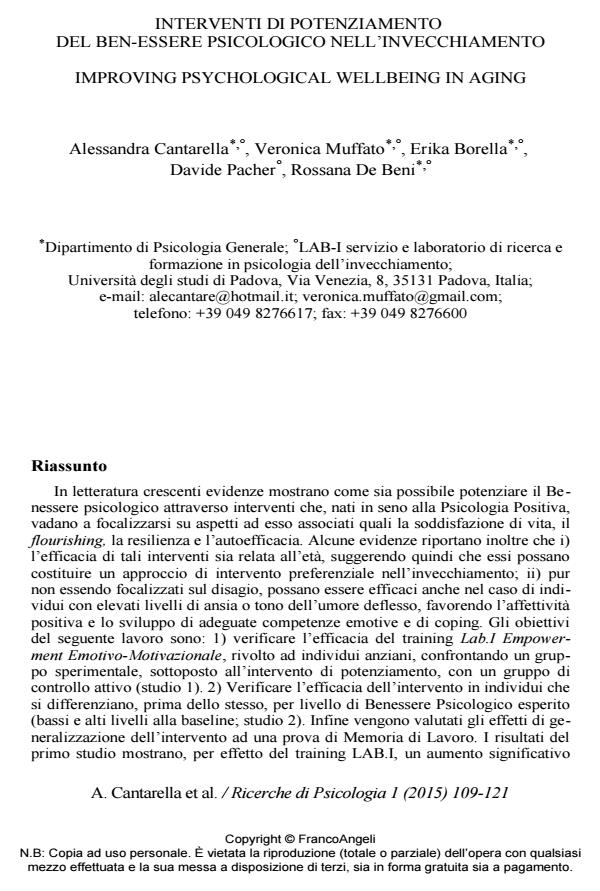Improving psychological wellbeing in aging
Journal title RICERCHE DI PSICOLOGIA
Author/s Alessandra Cantarella, Veronica Muffato, Erika Borella, Davide Pacher, Rossana De Beni
Publishing Year 2015 Issue 2015/1
Language Italian Pages 13 P. 109-121 File size 215 KB
DOI 10.3280/RIP2015-001006
DOI is like a bar code for intellectual property: to have more infomation
click here
Below, you can see the article first page
If you want to buy this article in PDF format, you can do it, following the instructions to buy download credits

FrancoAngeli is member of Publishers International Linking Association, Inc (PILA), a not-for-profit association which run the CrossRef service enabling links to and from online scholarly content.
There is evidence to suggest that psychological wellbeing can be improved by training focusing on life satisfaction, flourishing, resilience and self-efficacy, derived from positive psychology. Training studies have shown that: i) the efficacy of training depends on age, suggesting that it would be particularly effective in older people; and ii) it can promote emotional competences and coping strategies in people with high levels of anxiety or low mood, even if the training does not focus on a particular psychological disorder. The objectives of this study were to analyze the efficacy of Lab.I Emotional-Motivational Empowerment training in elderly adults, comparing an experimental group with a control group (Study 1), and participants with "low" versus "high" levels of wellbeing (Study 2). Transfer effects were also analyzed. Study 1 showed a significant improvement in psychological wellbeing and some of its component constructs, and a generalization effect on quality of life (assessed with the WHOQOL) and on a working memory task. Study 2 showed a greater benefit of the training in people with a low than in those with a high level of wellbeing, with a generalization effect on a working memory task. Positive psychology training thus seems to be a valid approach in aging.
Keywords: Well-being, aging, training
- Antonelli, E. (2007). Il Benessere soggettivo nella prospettiva psicosociale: una rassegna. Giornale italiano di Psicologia, 24, 57-113. DOI: 10.1421/24080
- Borella, E., Cantarella, A., Majer, S., Mattarello, T., De Beni, R., & Cornoldi, C. (2012). Memoria e metacognizione nell’invecchiamento: l’intervento strategico metacognitivo “Lab.I- Empowerment Cognitivo”. Ricerche di Psicologia, 1, 275-292. DOI: 10.3280/RIP2012-002009
- Crook, T., Bartus, R.T., Ferris, S.H., Whitehouse, P., Cohen, G.D., & Gershon, S. (1986). Age‐associated memory impairment: Proposed diagnostic criteria and measures of clinical change-report of a national institute of mental health work group. Developmental Neuropsychology, 2, 261-276.
- 10.1080/87565648609540348.
- De Beni, R., Borella, E., Carretti, B., Marigo, C., & Nava, L.A. (2008). BAC. Portfolio per la valutazione del Benessere e delle abilita cognitive nell’eta adulta e avanzata. Firenze: Giunti OS.
- De Beni, R., Marigo, C., Sommaggio, S., Chiarini, R., & Borella, E. (2008). Lab-I Empowerment Emotivo-Motivazionale. Firenze: Giunti OS.
- De Girolamo, G., Becchi, M.A., Coppa, F.S., D’Addario, A., Daru, E., De Leo, D., Galassi, L., Manganelli, L., Marson, C., Neri, G., Rucci, P., & Scocco, P. (2001). Il progetto italiano WHOQOL. Una rassegna dei risultati. In G. De Girolamo, M.A. Becchi, F.S. Coppa, D. De Leo, G. Neri , P. Rucci & P. Scocco (Eds.), Salute e qualita della vita. Torino: Centro Scientifico.
- Fava, G. A., & Tomba, E. (2009). Increasing Psychological Well‐Being and Resilience by Psychotherapeutic Methods. Journal of Personality, 77, 1903-1934. DOI: 10.1111/j.1467-6494.2009.00604.x
- Fredrickson, B.L. (1998). What good are positive emotions? Review of general psychology, 2(3), 300-319. DOI: 10.1037/1089-2680.2.3.300
- Huppert, F.A. (2009). Psychological Well‐being: Evidence Regarding its Causes and Consequences. Applied Psychology: Health and Well‐Being, 1, 137-164. DOI: 10.1111/j.1758-0854.2009.01008.x
- Kahneman, D., Diener, E., & Schwarz, N. (Eds.) (1999). Well-being: Foundations of hedonic psychology. Russell Sage Foundation.
- Keyes, C.L. (2010). Flourishing. John Wiley & Sons.
- Kunzmann, U., Little, T.D., & Smith, J. (2000). Is age-related stability of subjective well-being a paradox? Cross-sectional and longitudinal evidence from the Berlin Aging Study. Psychology and aging, 15(3), 511-526.
- Livingston, G., Minushkin, S., & Cohn, D.V. (2008). Hispanics and health care in the United States: Access, information and knowledge. Washington, DC: Pew Hispanic Center. Ryan, R.M., & Deci, E.L. (2001). On happiness and human potentials: A review of research on hedonic and eudaimonic well-being. Annual review of psychology, 52(1), 141-166. DOI: 10.1146/annurev.psych.52.1.141
- Seligman, M.E., Steen, T.A., Park, N., & Peterson, C. (2005). Positive psychology progress: empirical validation of interventions. American psychologist, 60(5), 410–421. DOI: 10.1037/0003-066X.60.5.410
- Sin, N.L., & Lyubomirsky, S. (2009). Enhancing well‐being and alleviating depressive symptoms with positive psychology interventions: A practice‐friendly meta‐analysis. Journal of clinical psychology, 65(5), 467-487. DOI: 10.1002/jclp.20593
- Van Bruggen, A.C. (2001). Individual production of social well-being: an exploratory study (Doctoral dissertation, University Library Groningen).
- Wechsler, D. (1981). Wechsler Adult Intelligence Scale (rev edn). New York: Psychological Corporation.
- Stili educativi genitoriali, benessere scolastico e rendimento scolastico in adolescenza Maria Giulia Olivari, Eleonora Mascheroni, Gaia Cuccì, Emanuela Confalonieri, in RICERCHE DI PSICOLOGIA 1/2019 pp.9
DOI: 10.3280/RIP2019-001001
Alessandra Cantarella, Veronica Muffato, Erika Borella, Davide Pacher, Rossana De Beni, Interventi di potenziamento del ben-essere psicologico nell’invecchiamento in "RICERCHE DI PSICOLOGIA " 1/2015, pp 109-121, DOI: 10.3280/RIP2015-001006